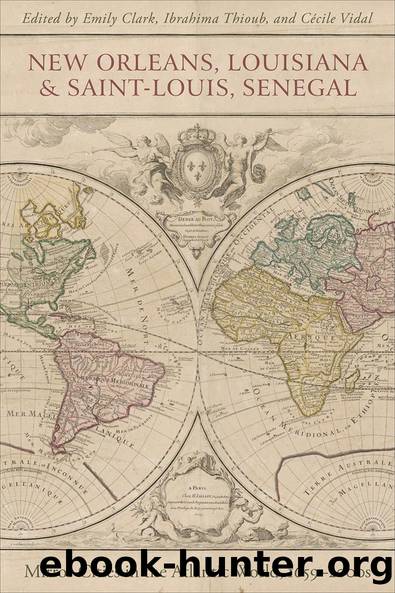New Orleans, Louisiana, and Saint-Louis, Senegal by Emily Clark Cecile Vidal Ibrahima Thioub

Author:Emily Clark, Cecile Vidal, Ibrahima Thioub [Emily Clark, Cecile Vidal, Ibrahima Thioub]
Language: eng
Format: epub
Tags: Nonfiction, History, Americas, Caribbean & West Indies, United States, Colonial Period (1600-1775)
ISBN: 9781469645193
Publisher: Omohundro Institute and University of North Carolina Press
Published: 2019-04-23T04:00:00+00:00
CITIZENSHIP AND THE ABOLITION
OF SLAVERY AFTER 1848
Conflicts of National Allegiance among the French in New Orleans
MARIEKE POLFLIET
I have often been struck by the reverberations that our political passions had here, and by the analogy that still exists in this respect between the population of Louisiana and the population of France.
âCONSUL GUILLEMIN to Alexis de Tocqueville, New Orleans, January 1, 1832
The year 1848 saw a series of events whose Atlantic dimension has recently been reasserted, affecting primarily the heart of the French colonial empire but also its peripheral areas.1 Despite the length of time that by the mid-nineteenth century separated New Orleans from the French colonial period, the reverberations of events in France were still of major importance, because of links maintained with the former colonial power and with the colonies in the Antilles. The upheaval caused by the 1848 Revolution, both in the exercise of French citizenship and in race relations, highlighted the tensions and ambiguities that had arisen in the outer parts of the French Empireâwhich also included Saint-Louis du Sénégalâin defining the rights associated with nationality and practices of citizenship.
At the time, New Orleans was a major Atlantic hubâa commercial outlet for the production of the South and West of the United States, a major port for European immigration, and a former colonial capital that had maintained special links with the Antilles. A sea and river port of the first importance, backed up by a slave laborâbased hinterland and economy, it was being transformed by swift economic and population growth.2 Although no longer part of the French colonial empire following the Louisiana Purchase of 1803, it was a frontier area between the United States and the French Empire.3 Interpersonal and legal links still connected it to the former colonial power. The Creoles of Louisiana, descended from French and Spanish colonists, along with members of the diaspora of refugees from Saint-Domingue, and more-recently established colonists from Martinique and Guadeloupe, formed coexisting generations of French colonial origin. There were also migrants from France, and thus a large number of French people in New Orleans continued to be governed by the French law of nationality and the authority of the French consuls. Under American law, the migrants also had the possibility of taking American nationality, but they were nevertheless in an ambiguous situation, as was revealed during periods of crisis and âcivic warsâ after 1848, because of the political upheavals that affected France and the United States at the time.4
Slavery was one of the major sources of tensions in the United States in the aftermath of the Mexican War, as a result of the debate about the status of the new territories acquired by the United States in the context of an upsurge in abolitionist movements. The abolition decree adopted by the provisional government of the French Republic, on April 27, 1848, following the February Revolution, was particularly important. The decision had a dual impact in New Orleans. First and foremost, it affected the colonies in the Antilles and was angrily
Download
This site does not store any files on its server. We only index and link to content provided by other sites. Please contact the content providers to delete copyright contents if any and email us, we'll remove relevant links or contents immediately.
| Central Africa | East Africa |
| North Africa | Southern Africa |
| West Africa | Algeria |
| Egypt | Ethiopia |
| Kenya | Nigeria |
| South Africa | Sudan |
| Zimbabwe |
Goodbye Paradise(2974)
Men at Arms by Terry Pratchett(2408)
Tobruk by Peter Fitzsimons(2065)
Pirate Alley by Terry McKnight(1911)
Arabs by Eugene Rogan(1841)
Borders by unknow(1791)
Belonging by Unknown(1473)
The Biafra Story by Frederick Forsyth(1327)
It's Our Turn to Eat by Michela Wrong(1305)
Botswana--Culture Smart! by Michael Main(1239)
A Winter in Arabia by Freya Stark(1226)
Gandhi by Ramachandra Guha(1198)
Coffee: From Bean to Barista by Robert W. Thurston(1184)
Livingstone by Tim Jeal(1154)
The Falls by Unknown(1143)
The Source by James A. Michener(1137)
The Shield and The Sword by Ernle Bradford(1102)
Egyptian Mythology A Fascinating Guide to Understanding the Gods, Goddesses, Monsters, and Mortals (Greek Mythology - Norse Mythology - Egyptian Mythology) by Matt Clayton(1089)
Africa: Altered States, Ordinary Miracles by Richard Dowden(1080)
